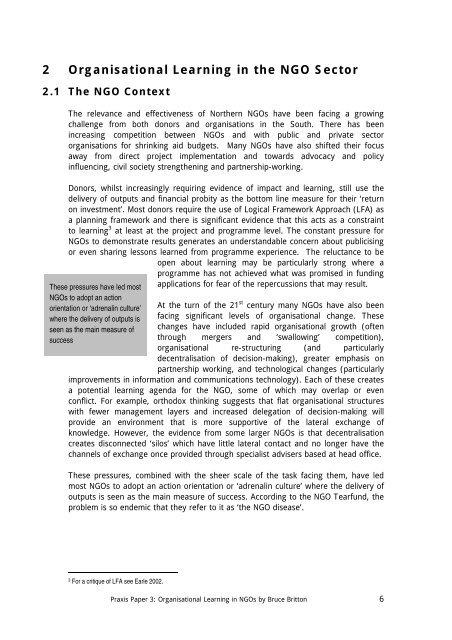Organisational Learning Discussion Paper - Are you looking for one ...
Organisational Learning Discussion Paper - Are you looking for one ...
Organisational Learning Discussion Paper - Are you looking for one ...
Create successful ePaper yourself
Turn your PDF publications into a flip-book with our unique Google optimized e-Paper software.
2 <strong>Organisational</strong> <strong>Learning</strong> in the NGO Sector<br />
2.1 The NGO Context<br />
The relevance and effectiveness of Northern NGOs have been facing a growing<br />
challenge from both donors and organisations in the South. There has been<br />
increasing competition between NGOs and with public and private sector<br />
organisations <strong>for</strong> shrinking aid budgets. Many NGOs have also shifted their focus<br />
away from direct project implementation and towards advocacy and policy<br />
influencing, civil society strengthening and partnership-working.<br />
Donors, whilst increasingly requiring evidence of impact and learning, still use the<br />
delivery of outputs and financial probity as the bottom line measure <strong>for</strong> their ‘return<br />
on investment’. Most donors require the use of Logical Framework Approach (LFA) as<br />
a planning framework and there is significant evidence that this acts as a constraint<br />
to learning 3 at least at the project and programme level. The constant pressure <strong>for</strong><br />
NGOs to demonstrate results generates an understandable concern about publicising<br />
or even sharing lessons learned from programme experience. The reluctance to be<br />
open about learning may be particularly strong where a<br />
programme has not achieved what was promised in funding<br />
applications <strong>for</strong> fear of the repercussions that may result.<br />
At the turn of the 21 st These pressures have led most<br />
NGOs to adopt an action<br />
orientation or ‘adrenalin culture’<br />
century many NGOs have also been<br />
where the delivery of outputs is facing significant levels of organisational change. These<br />
seen as the main measure of changes have included rapid organisational growth (often<br />
success<br />
through mergers and ‘swallowing’ competition),<br />
organisational re-structuring (and particularly<br />
decentralisation of decision-making), greater emphasis on<br />
partnership working, and technological changes (particularly<br />
improvements in in<strong>for</strong>mation and communications technology). Each of these creates<br />
a potential learning agenda <strong>for</strong> the NGO, some of which may overlap or even<br />
conflict. For example, orthodox thinking suggests that flat organisational structures<br />
with fewer management layers and increased delegation of decision-making will<br />
provide an environment that is more supportive of the lateral exchange of<br />
knowledge. However, the evidence from some larger NGOs is that decentralisation<br />
creates disconnected ‘silos’ which have little lateral contact and no longer have the<br />
channels of exchange once provided through specialist advisers based at head office.<br />
These pressures, combined with the sheer scale of the task facing them, have led<br />
most NGOs to adopt an action orientation or ‘adrenalin culture’ where the delivery of<br />
outputs is seen as the main measure of success. According to the NGO Tearfund, the<br />
problem is so endemic that they refer to it as ‘the NGO disease’.<br />
3 For a critique of LFA see Earle 2002.<br />
Praxis <strong>Paper</strong> 3: <strong>Organisational</strong> <strong>Learning</strong> in NGOs by Bruce Britton 6
















![CynefinFramework final [Read-Only]](https://img.yumpu.com/19017304/1/190x135/cynefinframework-final-read-only.jpg?quality=85)